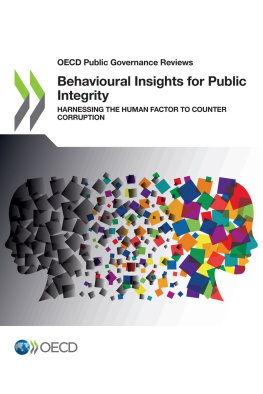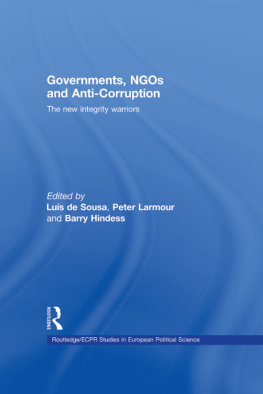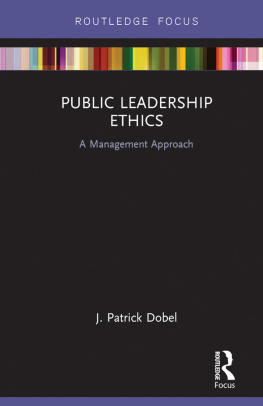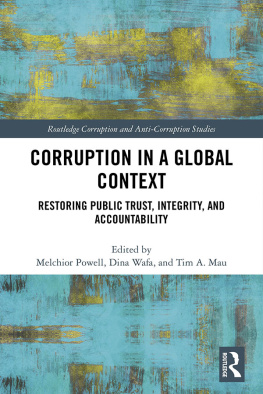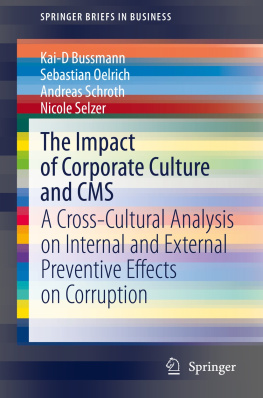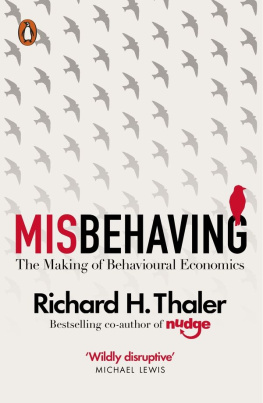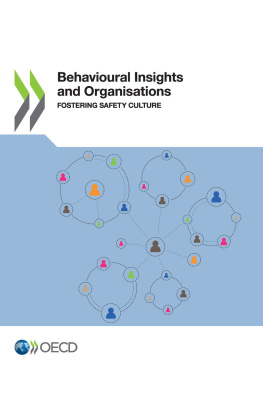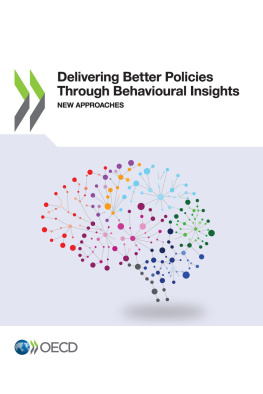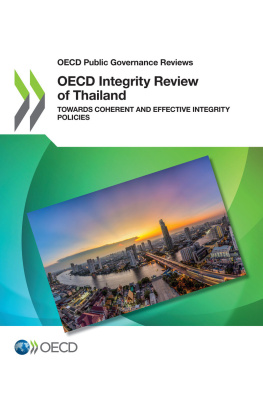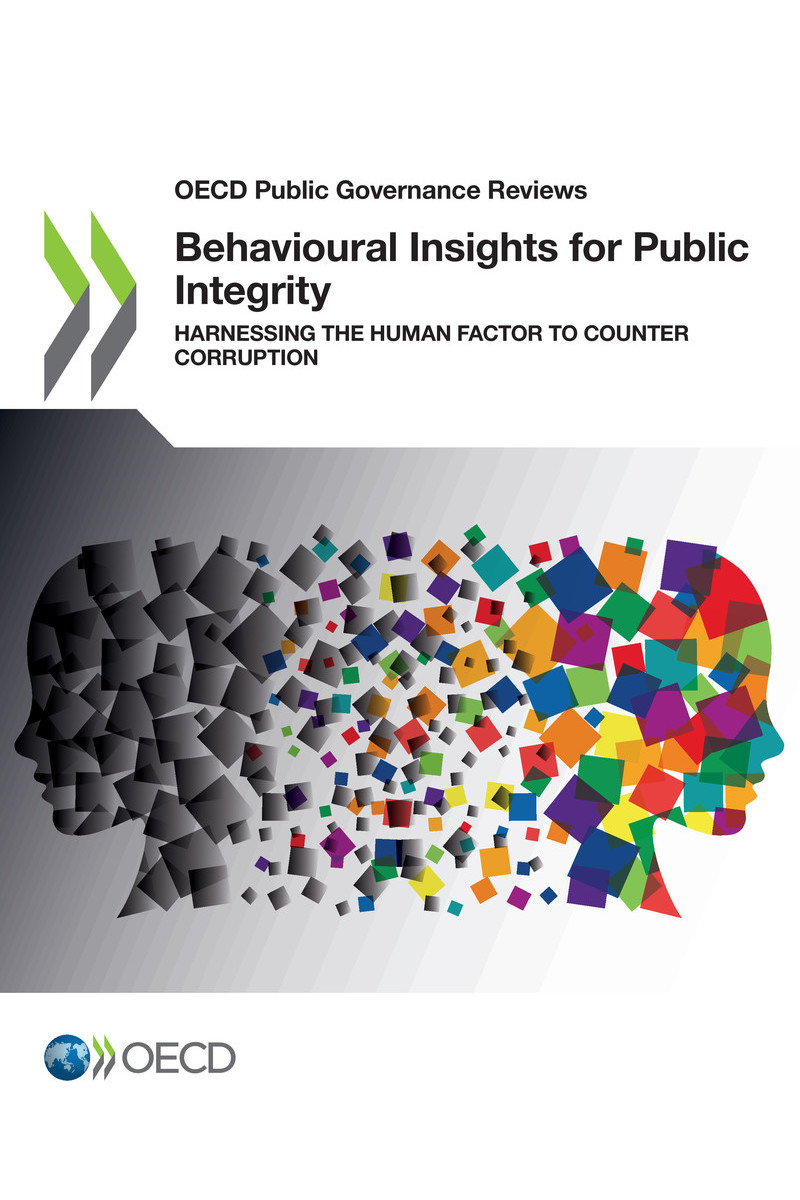OECD Public Governance Reviews
Behavioural Insights for Public Integrity Harnessing the Human Factor to Counter Corruption
Please cite this publication as:
OECD (2018), Behavioural Insights for Public Integrity: Harnessing the Human Factor to Counter Corruption , OECD Public Governance Reviews, OECD Publishing, Paris.
http://dx.doi.org/10.1787/9789264297067-en
Metadata, Legal and Rights
ISBN: 978-92-64-29705-0 (print) - 978-92-64-29706-7 (pdf) - 978-92-64-29853-8 (HTML) - 978-92-64-29729-6 (epub)
DOI: http://dx.doi.org/10.1787/9789264297067-en
Series: OECD Public Governance Reviews
ISSN: 2219-0406 (print) - 2219-0414 (online)
This work is published under the responsibility of the Secretary-General of the OECD. The opinions expressed and arguments employed herein do not necessarily reflect the official views of OECD member countries.
This document, as well as any data and any map included herein, are without prejudice to the status of or sovereignty over any territory, to the delimitation of international frontiers and boundaries and to the name of any territory, city or area.
The statistical data for Israel are supplied by and under the responsibility of the relevant Israeli authorities. The use of such data by the OECD is without prejudice to the status of the Golan Heights, East Jerusalem and Israeli settlements in the West Bank under the terms of international law.
Photo credits: Cover Lucky Team Studio/Shutterstock.com, Jessica Coccimiglio/Thenounproject.com, parkjisun/Thenounproject.com, Sergey Demushkin/Thenounproject.com, Gan Khoon Lay/Thenounproject.com, Ali Coskun/Thenounproject.com, Alvaro Cabrera/Thenounproject.com.
Corrigenda to OECD publications may be found on line at: www.oecd.org/publishing/corrigenda .
OECD 2018
You can copy, download or print OECD content for your own use, and you can include excerpts from OECD publications, databases and multimedia products in your own documents, presentations, blogs, websites and teaching materials, provided that suitable acknowledgement of OECD as source and copyright owner is given. All requests for public or commercial use and translation rights should be submitted to .
Foreword
Integrity is more than a rational choice against corruption. Essentially, promoting integrity is encouraging behaviour in the public interest over self-serving behaviour such as corrupt and unethical practices. Yet, human behaviour is often a neglected dimension in integrity policy making. Existing efforts to preventing corruption are still widely based on a rational decision-making model. Such an approach usually stresses the importance of increasing the costs and lowering the benefits of undesired behaviour. Common policy recommendations derived from this include control and sanctions, and reducing the discretion of decision makers in order to diminish their scope for misbehaviour. Sometimes, this has led to over-regulation, the establishment of paralysing controls, and distrust in the public administration.
Integrity policies have shifted from a narrow focus on deterrence and enforcement towards promoting values-based decisions in the public sector and society. A public integrity system, as recognised by the 2017 OECD Recommendation on Public Integrity, is the foundation of trust in governments, institutions and the whole of society. With Behavioural Insights for Public Integrity, the OECD is spearheading a human-centred approach to public integrity.
Evidence from behavioural sciences highlights the social and psychological factors influencing behaviour. The 2017 Nobel Prize in economic sciences awarded to Richard Thaler is an acknowledgement for behaviourally inspired policies such as nudges - subtly making a good choice more likely without limiting the decision makers options. Over the course of the last two decades, a growing body of experimental evidence from the laboratory and the field has shed light on how corrupt networks function, how individuals are tempted to profit from corruption and how they react to the incentives provided by anti-corruption measures. Behavioural research has produced a wealth of insights that policy makers can draw from to develop innovative and well-targeted integrity policies.
This report is the first comprehensive review of different strands of behavioural sciences to identify practical lessons for integrity policies. It answers questions such as: What are the determinants of a moral choice? When are people unaware of an ethical dilemma? How is trust built and why do people lose trust in integrity? Behavioural Insights for Public Integrity guides policy makers in building integrity systems in which moral responsibility is not overlooked. It contains concrete recommendations on how to incorporate behavioural insights in modern integrity policies. At the same time, it notes aspects of existing anti-corruption strategies that could turn into behavioural pitfalls, such as the reliance on over strict enforcement or the use of transparency as a panacea. Behavioural insights can enrich integrity policies by making them not only more effective and efficient, but also more human.
Acknowledgements
This report was prepared by the Public Sector Integrity Division of the OECD Directorate for Public Governance under the leadership and guidance of Jans Bertk and Julio Bacio Terracino. It was developed by Levke Jessen-Thiesen and Frdric Boehm with contributions from Carissa Munro, Felicitas Neuhaus, Frdric St-Martin, James Drummond, Jennifer Eddie and Laura McDonald. Preparatory work had been done by Jovana Blagotic. Invaluable inputs and comments were provided by Christopher Swartz, United States Office of Government Ethics; Johann Graf Lambsdorff, University of Passau, and Sheheryar Banuri, University of East Anglia. The report benefitted from the editorial assistance provided by Meral Gedik, Thibaut Gigou, Andrea Uhrhammer and David McDonald as well as Edwina Collins administrative support.
The review was approved by the OECD Working Party of Senior Public Integrity Officials (SPIO) on 15 December 2017 and declassified by the Public Governance Committee on 06 February 2018.
Executive summary
The human dimension of integrity policies
Human behaviour is often a neglected dimension in integrity policy making. Traditionally, efforts to prevent corruption have been based on a rational decision-making model. This has led to policy recommendations that favour applying control and sanctions, and reducing the discretion of decision makers in order to diminish their scope for misbehaviour.
Behavioural insights enable policy makers to integrate two often-overlooked aspects into integrity policies: first, at the core of integrity is an ethical choice based on individual moral reflection. Second, social dynamics affect individual behaviour. Integrity is influenced by society, peers, neighbours and colleagues. Integrating the dynamics and pitfalls of these two core aspects can help policy makers design modern, effective integrity policies.
Central findings of behavioural sciences
Normally, policies to strengthen integrity are designed on the assumption that decision makers are motivated to act ethically. Indeed, the majority of people feel committed to integrity and think that they generally act accordingly. Yet, in reality, people are less consistent and less categorical in their ethical decisions than they admit to themselves. Sometimes a person is not even aware when their behaviour diverts from ethical standards. This is because justifications and biased judgment blur the perception of integrity breaches. Public policies can, therefore, affect individuals moral choices by emphasising or raising their moral reference points:

